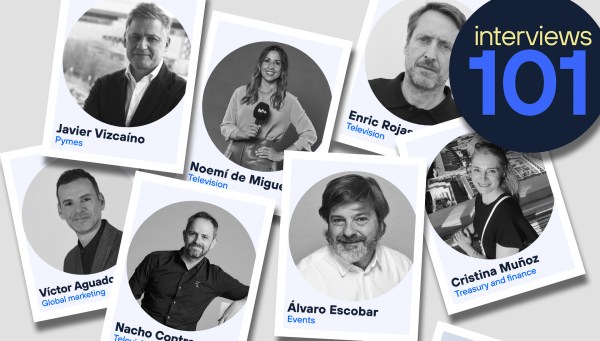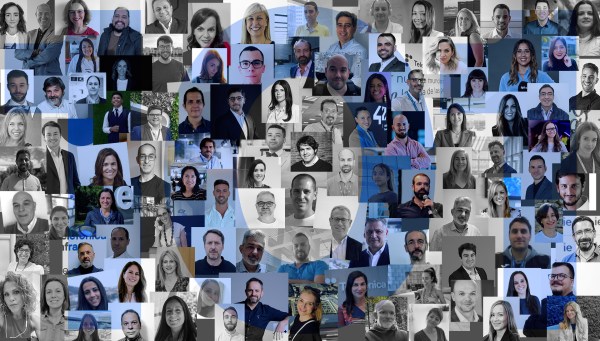Tell us a little about yourself. What does your job at Telefónica involve?
I have a law degree and have always worked in marketing.
From the beginning, before joining Telefónica, and once I arrived here, when I started in events, I spent a few years in branding, many in sponsorship, and for the last six years in cross-functional projects.
These are initiatives that involve the simultaneous coordination of different business units and functional areas—such as network, systems, sales, customer service, legal, and finance—in order to achieve a common goal with strategic impact. These projects break down traditional departmental structures and require an integrated view of the business.
How would you describe the main characteristics of cross-functional projects?
These are projects that transform the company from different angles at the same time, so we could list many different characteristics, but the main ones I have identified in this type of initiative are:
- Real cross-functionality: it is not enough to coordinate, you have to align priorities from areas with very different natures and KPIs, and multidisciplinary teams.
- Shared governance: they usually have multiple stakeholders with different levels of decision-making.
- Strategic and transformational approach.
- Cultural change management: within our own company, very different cultures coexist in different areas. Knowing how to interpret and align these cultures towards a common goal is key to avoiding friction and accelerating results; it is a critical part of success.
- Customer and efficiency focus: these are projects that must generate impact on both the customer experience and internal efficiency.
In short, a cross-functional project in the telecommunications sector is not just the sum of efforts between different areas; it is a key transformation tool that requires leadership, business vision, and execution capabilities. This is the type of challenge that motivates me the most, because it connects strategy with reality and allows us to leave a tangible impact on the organization and the market.
What is the best way to ensure that these projects involving collaboration between different departments are effective?
For a cross-functional project to be truly effective, where very diverse teams coexist—from network engineering to marketing or customer service—the most important thing is to build a solid collaboration structure based on four key pillars:
- Clear and shared common goal: the first thing is to ensure that all areas involved understand the ‘why’ of the project.
- Transparent and continuous communication: in cross-functional projects, misunderstandings often arise from a lack of information or a partial view. Regular meetings, milestone tracking, visual reporting, and collaborative tools that help all teams stay aligned and move in the same direction are key.
- Be empathetic and a facilitator: it is essential to understand the logic and objectives of each area, find common ground, and reduce the impact of conflicts that will inevitably arise. The success of a cross-functional project depends not only on the plan, but also on the ability to mobilize the organization toward a common goal.
In short, the key is to create a horizontal work dynamic with strong coordination. In the Telco environment, where projects are often complex and high-impact, this is what makes the difference between moving forward and simply coordinating.
What professional profiles are needed?
It depends on the characteristics of each project; you look for different profiles. But what is essential in a cross-functional project is “your skills.” For me, the most important ones are:
- Knowing how to work in a team, in order to contribute to the achievement of common goals over personal success.
- Good communication, to express ideas clearly and make yourself understood, since not all team members are technically familiar with each other’s work, as well as actively listening to others.
- Responsibility for fulfilling your obligations, tasks, and commitments, since the work of the rest of the team depends on it.
- Ability to plan, prioritize, and organize tasks efficiently to maximize productivity.
- Be creative in your work, innovating and thinking outside the box.
- Critical thinking, with a willingness to question the ideas of others and your own, without becoming frustrated.
- Be decisive, to face and overcome any difficulties that may arise, seeking to achieve the project’s goals.
- Adaptability to change and new situations, maintaining the same level of performance and enthusiasm.
- And, derived from the previous point, resilience, to overcome adversity and learn from it, remain calm under pressure, and keep moving forward.
Changing the subject, what was it like working so closely on Telefónica’s centenary?
I never tire of saying it… LUCKY.
When you’ve been working at a company for 25 years, you consider it your home. You like your job, you’re aware of the opportunities Telefónica has given you, how you’ve grown personally and professionally, and you feel very grateful.
And I think the best way to show that gratitude was to give my all to every project we did for the celebration, putting in many hours of work and a lot of love to make sure everything went perfectly.
What advice would you give to those who will be working on the company’s bicentennial in 2124?
First and foremost, enjoy it! You’re working to make sure everything is perfect and everyone is happy, under so much pressure that sometimes you forget to enjoy that magical moment that is celebrating a CENTENNIAL.
Secondly, remind them that their work will be a legacy for future generations. Tell them to put the dedication and love into it that it deserves. Working on this project is not an obligation, it’s a privilege. Put your heart and soul into it.
Which people working at Telefónica would you nominate for this interview because you consider them excellent at their job?
Esther Arellano Villanueva. I was fortunate enough to work with her on a complicated Centenary project, and I was impressed by her professionalism, her decisiveness, her drive, and the smile with which she always approaches her day-to-day work. She’s a 10 out of 10.







